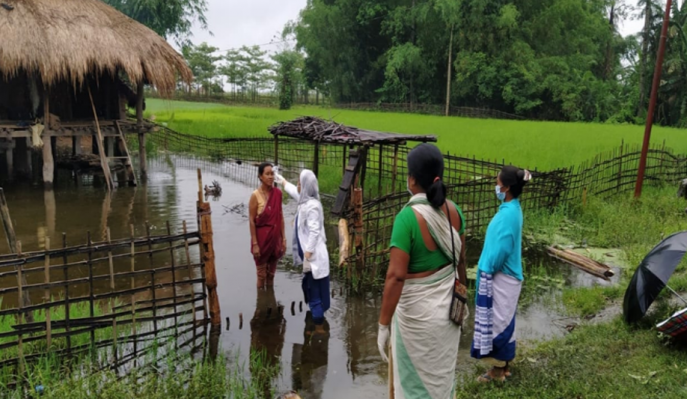In the state of Assam, multi-pronged approaches, including strict quarantine measures, surveillance and activating a strong primary health care (PHC) network, have proved successful in managing the COVID-19 pandemic.
PHC, at all times, particularly in times of crisis, is a solid way to engage the community and provide the health care services that people need. It is a crucial step towards achieving universal health coverage (UHC) and ensuring health for all.
Thanks to strong community engagement and surveillance, and access to testing, tracing and treatment and health care services, COVID-19 is being kept under control in Assam.
The National Health Mission of Assam has worked with WHO through the UHC Partnership to strengthen a network of PHC centres, and to ensure a flexible and responsive approach to tackling COVID-19.
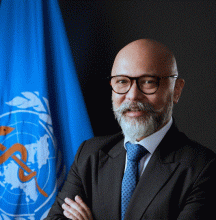
“The high recovery rate of COVID-19 with 98% and low mortality rate of 0.46% (as of 23 November 2020) are testimony to the fact that Assam has been successfully managing the COVID-19 pandemic. Through strong collaborative approaches between the Department of Health and Family Welfare, Government of Assam and WHO, the UHC Partnership will go a long way, and the State will be able to set new benchmarks of quality for public health systems. WHO India is committed to extend technical support to the State in its best possible form to ensure better healthcare for the citizens.”
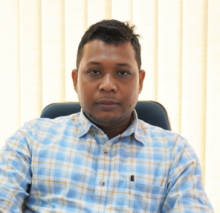
“WHO has been continuously extending technical assistance to roll out different health programmes in Assam to strengthen the health system and to realize the goals of UHC. Since the beginning of the COVID-19 pandemic, WHO has been supporting state in different health initiatives to deliver quality healthcare services. The timely support of WHO has proved highly useful for state.”
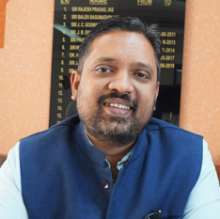
“The support provided by WHO through its office at Guwahati, Assam has been enormous and invaluable. Qualitative inputs and insights have provided the strongest guidance we have received to develop and implement many of our impactful programmes to contain and treat COVID-19.”
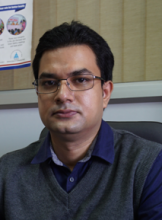
“WHO has been actively supporting the implementation of the Comprehensive PHC programme through the functional Health and Wellness Centres with an aim to achieve UHC. During the COVID-19 pandemic, WHO has been supporting the State in the best possible way as a true partner."
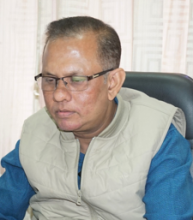
“Since the onset of COVID-19 pandemic, along with WHO, Jhpiego, and other development partners have been supporting the State in strategic planning, developing different standard operating procedures, acts and guidelines and will continue to support the State in the best possible way.”
THE LONG READ
Ms Suchitra Goala, 45, is a community health worker (CHW) in Karimganj District in Assam, a state in northeastern India. She is what is known locally as a ‘COVID-19 warrior’. Since the pandemic took hold in March 2020, she has been supporting her local community in the COVID-19 emergency response. In India, CHWs are called accredited social health activist (ASHA), and they serve as the link between communities and health care facilities.
“Being a community health worker and a COVID-19 warrior, I am so proud that I have been contributing in my best possible way to support my fellow villagers during the COVID-19 pandemic. It is so heartening to share that I could ensure the home quarantine of 45 people, who returned to my village from other states after the lockdown relaxed. I participated in the Assam Community Surveillance Programme when I visited house-to-house in my area as a part of active community surveillance,” Suchitra said.
Testing, tracing and treatment through the increasing network of primary health care (PHC) centres are crucial to the national response to COVID-19. WHO, through the UHC Partnership, was already working closely with Assam State health authorities to strengthen PHC centres across the state when COVID-19 struck. The PHC network has provided a solid base, not only to make progress towards universal health coverage (UHC), but also to tackle the challenges that COVID-19 brings to communities.

The State of Assam’s response to COVID-19
Assam has population of 31.2 million people who live in 33 administrative districts. In response to the threat of COVID-19, the entire country entered into lockdown from 24 March to 17 May 2020. But when restrictions eased, many people who were staying in other states of India, including COVID-19 hotspot areas, returned to Assam. This contributed to the rise in COVID-19 cases in Assam.
Strong political and administrative commitment from the Honorable Chief Minister of Assam and Honorable Health Ministers coupled with the dedication of senior officers of health and allied departments, health staff and workers played a major role in fighting the COVID-19 pandemic with a united effort. A broad array of measures, including activating a strong PHC network, surveillance and strict quarantine procedures, have helped in the response to the pandemic. Effective case management contributed to encouraging recovery rates. As of 23 November 2020, the mortality rate from COVID-19 in Assam remains low at 0.46% with 98% recovery rate of cases.
“The support provided by WHO through its office at Guwahati, Assam has been enormous and invaluable. Qualitative inputs and insights have provided the strongest guidance we have received to develop and implement many of our impactful programmes to contain and treat COVID-19,” said Dr Lakshmanan S, Indian Administrative Services Officer, Mission Director, National Health Mission (NHM), Assam.

Community surveillance brings ‘assurance’
For one month, from 7 May 2020, the Government carried out the Assam Community Surveillance Plan—an intensive surveillance in all 28,000 of its villages—to look for people with symptoms of severe acute respiratory infections and influenza like illness, fever or any other disease. This approach was called “COVID-19 plus”. Community health workers or accredited social health activists visited door-to-door to list potential cases and link them with team members to conduct screening on the following day.
The response to this first phase was encouraging. With support from WHO, the State decided to carry out a second phase, calling it the Assam Targeted Surveillance Plan. It is more widely known by its tag name “NISCHAYATA” which means ‘assurance’. Under NISCHAYATA, intensive testing was carried out at potential hotspots, like market areas, interstate truck and bus terminals and parking lots.
Screening teams also randomly tested people who are at high risk of getting COVID-19 such as health workers, police, transport workers and hotel staff. This intensive testing approach was instrumental in identifying many COVID-19-positive patients, making timely treatment and isolating the patients possible. This also helped keep the virus from further spreading.

“I consider myself blessed and privileged that during the COVID-19 pandemic, I could work closely with team members in carrying out multiple activities such as awareness generation, contact tracing, training and mentoring frontline workers under NISCHAYATA, and support the health and district administration of Karimganj district of Assam,” said Ms Bhararti Bhowmik, 31, a COVID-19 warrior and district community mobilizer from Karimganj District, Assam.
Patients are grateful for the health care they have received through the local health system.
“During my stay at the COVID-19 Care Centre, I was given the best care by the healthcare team, which touched my heart. Every day, a member of the team used to visit me few times to check on my health condition and suggested tips for my betterment. The stay and food for the entire duration was free of cost. The day-to-day counselling by staff of the COVID-19 Care Centre gave me much needed psychological strength, which acted as a catalyst in my recovery and helped me to come out from mental trauma caused by COVID-19,” said Mr Kisholay Das, 42. He works with the Urban Livelihoods Mission as State Officer in Guwahati.
“My dream of life, which was almost fading away due to COVID-19, was gifted by the expert healthcare team. I am thankful to each one of them for doing their best to save me. The health system strengthening efforts of Government of Assam has been yielding results in the form of saving many lives,” said Mr Sumit Roy, a COVID-19 survivor from Karimganj District of Assam.

Flexible support to the COVID-19 response
WHO’s support to Assam, through the UHC Partnership, began in April 2019. This work is focused on supporting the implémentation of India’s ambitious Comprehensive Primary Health Care (CPHC) flagship programme to be rolled out through functioning Health and Wellness Centres, in order to achieve UHC. With COVID-19 emerging in March 2020, State authorities requested additional technical assistance for the COVID-19 response. With the flexible and bottom-up approach that underpins the work of the UHC Partnership, WHO was able to respond to the State’s needs.
“WHO has been continuously extending technical assistance to roll out different health programmes in Assam to strengthen the health system and to realize the goals of UHC. Since the beginning of the COVID-19 pandemic, WHO has been supporting state in different health initiatives to deliver quality healthcare services. The timely support of WHO has proved highly useful for state,” said Dr Dipjyoti Deka, State Programme Manager, National Health Mission, Assam.

“It is a privilege for WHO India to partner with the Assam Government in its endeavour towards UHC and facilitating the implementation of the programme, through functionalization of Health and Wellness Centres. It is indeed heartening to note the strong and proactive political commitment of the Government of Assam in the State’s COVID-19 response, with the Chief Minister of Assam and Health Minister leading by example and duly complimented by hard work of dedicated officers and health care providers at all levels,” said Dr Roderico H Ofrin, WHO Representative to India.
“The high recovery rate of COVID-19 with 98% and low mortality rate of 0.46% (as of 23 November 2020) are testimony to the fact that Assam has been successfully managing the COVID-19 pandemic. Through strong collaborative approaches between the Department of Health and Family Welfare, Government of Assam and WHO, the UHC Partnership will go a long way, and the State will be able to set new benchmarks of quality for public health systems. WHO India is committed to extend technical support to the State in its best possible form to ensure better healthcare for the citizens,” Dr Ofrin added.
The UHC Partnership works in 115 countries to help governments accelerate progress towards UHC through funding from the European Union (EU), the Grand Duchy of Luxembourg, Irish Aid, the Government of Japan, the French Ministry for Europe and Foreign Affairs, the United Kingdom – Foreign, Commonwealth & Development Office and Belgium.

WHO participates in a range of Government committees, which oversee health policy and implementation matters in Assam. Some of the direct interventions include developing standard operating procedures and guidance on different initiatives as well as drafting technical briefs for both the state and national Government. WHO has also shared global and India-specific COVID-19 updates and useful information on appropriate tools and guidelines. Support for the training of ‘COVID-19 warriors’ who operate at the community level to enhance surveillance and case management was also provided. In addition, support was provided for the supervision and review of implementation processes, documentation of COVID-19 success stories from other states and countries for the purposes of learning and adapting to Assam’s context, and documentation of Assam’s COVID-19 management.
“WHO has been actively supporting the implementation of the Comprehensive PHC programme through the functional Health and Wellness Centres with an aim to achieve UHC. During the COVID-19 pandemic, WHO has been supporting the State in the best possible way as a true partner,” said Dr Rahul Kumar Sarma, State Programme Officer (comprehensive PHC and non-ccommunicable diseases) National Health Mission, Assam.

WHO also works strategically with partners at sub national level. “Since the onset of COVID-19 pandemic, along with WHO, Jhpiego, and other development partners have been supporting the State in strategic planning, developing different standard operating procedures, acts and guidelines and will continue to support the State in the best possible way,” said Dr Joydeep Das, Regional Manager, Jhpiego (Assam and Northeast).
As Assam strives to tackle the enormous challenge of COVID-19, its leaders recognize the importance of a strong PHC approach to respond to the needs of communities. PHC, in “ordinary” times, and particularly in times of crisis, is a solid way to engage the community and make health services more accessible. It is a crucial step towards achieving UHC and ensuring health for all.

No health without health workers
Health workers perform a fundamental role in ensuring that the population can access the health services they need during emergencies and in normal times. They help build healthier and safer communities by keeping people aware and engaged in their health issues. The COVID-19 crisis sends a strong message that resilient health systems can only be achieved with a strong health workforce. Protecting everyone requires urgently addressing health worker shortages, investing in their capacity building and ensuring that their work environments enable them to serve in the best way they can.
